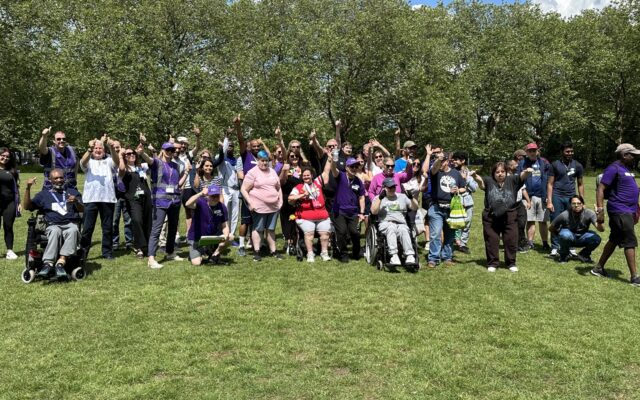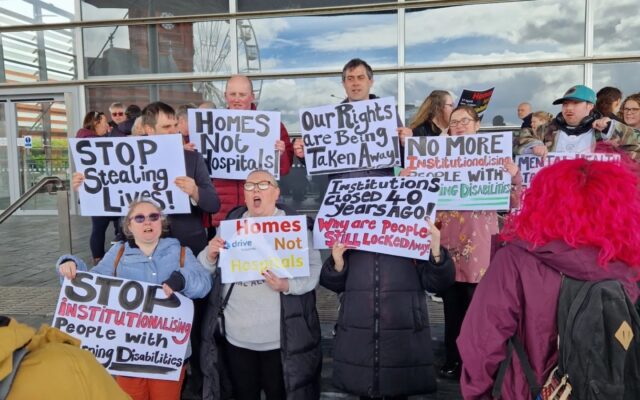A year ago, I argued here that self-advocacy was changing from a “nice to have” to an essential contributor to wellbeing for many. Since then, coronavirus has wrought dramatic change – and few people have been as seriously affected by this as those with learning disabilities.
It is time to look again at the role of self-advocacy groups during the pandemic and, thanks to All Wales People First, Learning Disability England and research by the Open University, we know much about how they have been filling the gaps.
As many readers know, people with learning disabilities are particularly vulnerable to having their lives damaged by pandemic restrictions through reduced staff contact, sudden changes and limits to routines and activities and difficulty in understanding and adapting to measures such as self-isolation and social distancing. Wellbeing is at risk from loss of contact with family and friends, day services and voluntary roles, and the reduction or withdrawal of care packages. Some people have been unable to go out because they live with shielded residents.
The Open University interviewed people from 11 self-advocacy groups in England during July 2020. It found they were going to great lengths to fill the gaps to provide support at a distance. One interviewee said: “What we were doing is picking up things that people are saying that aren’t being picked up by the providers and the council.” The outstanding message was the need to keep people connected, inform, protect mental health and give them a reason to get up in the morning.
Several organisations set up phone buddy rotas for weekly chats. The buddies were supported by dedicated staff and had access to resources so if someone was, for example, lacking food or medication, the buddy could help to set up local support.
Happy to be proved wrong

Much support to keep connected has migrated online in ways that had been unimaginable and unimagined before. I was not alone in believing that it was not possible to connect remotely with people with learning disabilities – even though roughly half of my Facebook friends are self-advocates. How wrong we were.
Efforts by self-advocacy groups to acquire laptops through donations and to assist people to get online have really paid off. There have been chats, coffee mornings, discos, parties, quizzes, exercise classes… not to mention online committee meetings. One self-advocate who chairs board meetings commented how being in control of the mute button made his job much easier.
Most also used online meetings to discuss the latest Covid-19 guidance. One group arranged for a nurse to join a call to explain how health activity had migrated online, how to make appointments and what to expect from doctors. Staff and self-advocates were able to help with booking appointments online, welfare benefits assessments and emotional issues. Self-advocates and staff said sharing experiences was helpful. It was important not to trivialise what was happening and for everyone to know “it’s OK to not be OK”.
Learning Disability England hosted regular friends and family get-togethers. English self-advocacy groups made contact with one another, opening the possibility of recreating the English network that died when the National Forum folded in 2017.
One group enjoyed online chats with self-advocates in other countries, while another started a much-requested Sunday social. In exceptional cases, staff delivered food parcels and medication. More saw their role as showing people where they could get help.
Formal guidance, fun ideas
Most groups produced regular newsletters, with the latest guidance in an easy-read format (not something the authorities took seriously), as well as ideas for activities, such as local walks. This work is mostly unfunded and often meant redirecting money from elsewhere with funders’ agreement. In Wales, self-advocacy opened up ways of communicating with the government.
All Wales People First collected members’ stories and used these to inform the Welsh government about the impact of lockdown and to lobby for change, including for more consistency among service providers whose (mis)interpretation of the rules was making life unnecessarily restricted for some. However, it is important not to paint too rosy a picture. Many people are on the wrong side of the digital divide, and not just for financial reasons.
For some, it is a matter of confidence in the absence of someone sitting next to them. Some support staff were discouraging, fearing online abuse or simply not willing to share home facilities. Some families lack confidence so are not able to help. People also say digital does not make up for the loss of face-to-face contact, activities, holidays and other things that make life worth living for everyone.
Finally, the biggest question: if self-advocacy groups have filled so many gaps, what happens where there is no group? Who is providing the connectivity, support and advice? I do not have the answer but this question needs to be addressed urgently.




